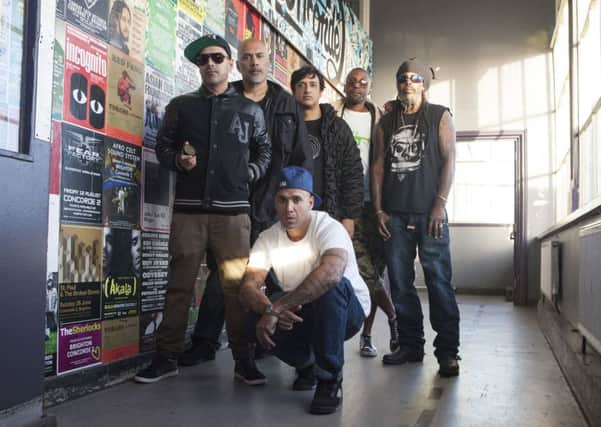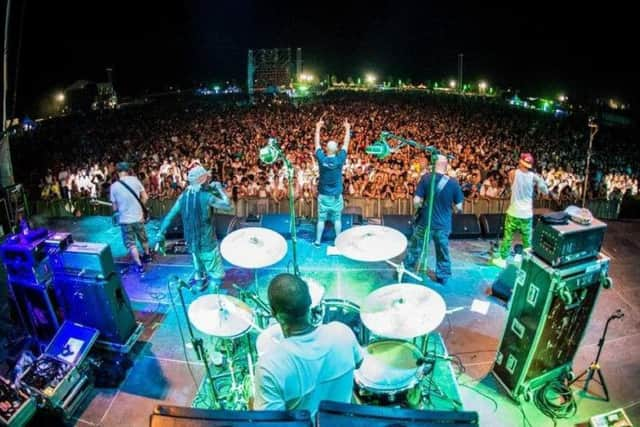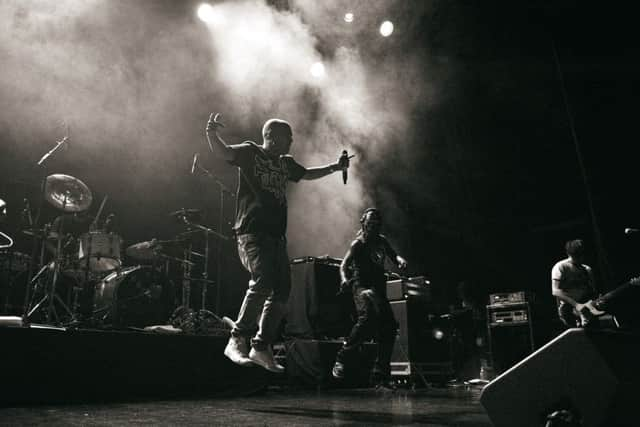Asian Dub Foundation: ‘We heard something different in jungle – a more oppositional, punkish, raw, inner city vibe’


It’s a long hop from 1998, the year the UK charts awoke to Asian Dub Foundation’s raw, politicised blend of jungle, hip-hop, bhangra and rock, to a Britain dogged by division in 2019, but the messages they convey, it seems, are no less potent.
New song Youth Quake Pt 1 pairs swirling electronica and breakbeats with speech that teenage Swedish activist Greta Thunberg gave to the United Nations conference on climate change in 2018.
Advertisement
Hide AdAdvertisement
Hide AdADF guitarist Steve Chandra Savale explains: “There are a lot of things that we could talk about, like whether certain things that are bandied around are practical or not, whether it’s all middle-class privilege, all the usual tropes, but there are two things that underlie that track. Firstly, there can be no return to business as usual, we can just go on having a chat about it then going back and pretending it’s not happened and it doesn’t need to be addressed, and the other thing I thought this is the thing about the kind of hyper-reality media we live in. Someone becomes a meme and the actual power of what they were saying can get neutralised or fawned over, you saw her become a darling of a section of the chattering classes and on the other hand really nasty, vicious personal attacks from those who hate everything to do with environmental things.


“What I was thinking of was her words are pretty militant and uncompromising and her delivery is very clipped and powerful and clear and I just wanted to put some sound behind it that emphasised the power and the oppositional tone of what she was saying.”
The new song comes just week after the 21st anniversary reissue of ADF’s ground-breaking album Rafi’s Revenge, a record that led to the collective being hailed “the most important band in Britain” and feted by the likes of Primal Scream and David Bowie.
“I don’t want to sound too egotistical,” Savale jokes when it’s suggested the record was farsighted. “As a sound, it’s really interesting. You will struggle to find anything that had that kind of approach with not drum and bass but that original jungle rhythm, with live bass and guitar, a sort of punkish attitude. In many ways jungle as a club-based thing went another way into an often excellent, very sophisticated vibe like Goldie or LTJ Bukem or Roni Size. Great as those artists were, we heard something different in jungle – a more oppositional, punkish, raw, for want of a better term ghetto, inner city vibe and we added live bass and guitar, along with the music of our parents in there as well.
Advertisement
Hide AdAdvertisement
Hide Ad“I think that’s what makes it stand up really well because it wasn’t really a club act, it was very much a band, but sometimes the people in it didn’t even realise that. We were supporting the Beastie Boys and doing all the stuff with the Primals and Radiohead, David Bowie would keep phoning us up. I happened to be in the only band where two people actively disliked David Bowie and one person was indifferent and one person had never heard of him. It was absolutely true – why should [rapper] Deeder [Zaman], who was 16 years old and had grown up on drum and bass, reggae, Bollywood and Bangladeshi folk music, have heard of him?


“I really think it’s a unique sound and I don’t think it sounds dated. Jungle itself is still a very interesting sound, as a little time period those records sound incredible, there hasn’t been a high-tempo music like that since. And actually the lyrics and Deeder’s delivery I think sounds better now to a lot of people if they get to hear it than it did then. The very fast junglist MC-ing ragga style was not particularly well known at the time outside its niche and to put it in front of a band, a quite significant amount of our audience was coming from an indie guitar vibe with all the interest from Primal Scream and NME. I remember at the time people going ‘he raps so fast’, but now, after 10 years of grime, it’s pretty normal. It actually sounds like there’s a lot more clarity to it now, contemporary music has kind of caught up with it.
“Another thing that distinguishes it is the guitars. I realise now that what I brought to it wasn’t what I thought I was bringing to it. I thought I was developing this alternative guitar style that was supporting drum and bass and reggae, but actually the aggression of it puts it in a long line of punk and, dare I say it, the r’n’r words. It has that in in it and I think that’s why if you listen to it now it had its own little time and space. When I held the gatefold sleeve [of the reissue] in my hand and played the vinyl I was able to appreciate it, it’s so long ago but it still sounds contemporary.
“There’s a punky, rock and roll-y, ska-y kind of thing going on but it futuristic in vibe as well. It’s equal part Specials, equal part Public Enemy, equal part jungle/drum and bass, equal part the more confrontational Indian/South Asian music like qawwali. It’s uniting these fields of oppositional music, with an anti-establishment vibe. It’s also very electronic, we were using cheap technology of the time. We thought we were doing that more than anything else. We had a track called Digital Underclass – that’s how we saw ourselves. When you look back to it now, that actually had a lot of continuity to music that had gone before.”
Advertisement
Hide AdAdvertisement
Hide AdADF grew out of a community music in Farringdon, south London. “The first five or six years of it, I don’t know if you could do it in the same way,” Savale reflects. “We had an institution, Community Music, which was actually set up by avant garde, left-wing jazzers, the idea was to create educational, inclusive techniques to get people involved in music no matter who they were. ADF came out of that. Dr Das was in the second or third wave of people who came into that world but with dub reggae, techno and early industrial vibes and added that into the much older radical jazzers.
“The idea was we would go to youth clubs and housing projects, outreach, all kinds of things, and that’s how Deeder came into the group, through one of these workshops, and some later members like Aktar [Ahmed]. It was the complete opposite of the normal band thing where people meet at school or college or they’ve all got something in common. It was very much born of quite radical philosophy and practice that stretched way back to the 50s and 60s, but we were much younger and we had a different take on it. So it was an alliance of teachers, youth workers and very young people that formed ADF, not just members of the band but the whole vibe.
“At the early ADF gigs at Community Music you wouldn’t believe the kind of people we would get there. You would get the local Bangladeshi youth club come down and people coming down from Bradford then you would get South African musicians who had been exiled under apartheid and early 70s avant garde Marxist singers, it was an incredible thing, really, and it produced ADF, it was testament to the fact that it actually worked artistically. This was very unfashionable when you think about it, especially in the 90s. The 90s were the return of the worst aspects, in terms of what the NME was writing about and was getting famous, Britpop. It was not just the music being reactionary but the behaviour, the egotism and ultra-individualism of the artists as well which was really encouraged and was sometimes more important than the music – who’d had a fight with who and who took this amount of drugs and whatever. In the 90s if you looked at the guitar band scene that was far more important than the music, it was really weird, and it made us quite angry.
“You had this amazing inner city music, jungle, that was being ignored in favour of re-written Ray Davies songs. We were very angry, we had a lot of things to get off our chest. We were from very different backgrounds but we all had this thing where we’d grown up in Indian, Bangladeshi, brown, Asian, whatever you want to call it, and that story had not been told at all. The first thing that I noticed was My Beautiful Laundrette, that was the first time that I felt there as something – ‘oh my gosh, wow, someone’s saying something about this’ and that wasn’t until 1985-86. In the 70s and the 80s the only presence that Asians had in popular culture was as a joke, as some kind of butt for comedy. You watch your average 70s comedy and it is so unacceptable now, we were the most s**t on group, even more than Jamaicans or Afro-Caribbeans, it was amazing, and the physical attacks, the BNP stuff, there was so much to talk about and our own personal experiences as well. Our own personal experiences were very different form each other.
Advertisement
Hide AdAdvertisement
Hide Ad“This is the funny thing about ADF – to a lot of people it seems like this collective mass but actually the people in it, especially at that time, had a lot that wasn’t in common with each other, other than the fact that we all experienced this larger structural reality.”
Before breaking into the charts in Britain, ADF found an audience in France, where their album R.A.F.I. sold 100,000 copies. Savale recognises that they struck a nerve at a point when the far-right Front National was on the rise. “The fact is the music struck a nerve as well,” he says, “that was because it was powered by those emotions. There were lots of other groups that would appear at anti-racist things in France but we had something extra on top of this. I remember when it happened when we supported Transglobal Underground in Paris and we just blew the place up unintentionally.
“We hadn’t considered ourselves much of a live band but in ’95 it started to happen. Dr Das originally never looked much at the audience. I think it took us by surprise. I was always a bit wired onstage and Deeder being young was just being an MC on the mic and to see him doing it was pretty compelling, but we hadn’t intended to be a serious live band.
“I think it was in France, because we started playing with monitors and good systems and this thing that we created sort of took shape and form and we played this gig in France with Transglobal Underground that was very good. We were on the same label at the time but it was quite obvious that we were doing something very different. We were on Nation Records and we had this electronic/world-y category that we were getting gigs with other groups.
Advertisement
Hide AdAdvertisement
Hide Ad“I remember the stark contrast with this group – I won’t name them, but they were middle-aged English people sitting down cross-legged playing tablas and sitars, they weren’t a bad group at all, actually, but they were all doing this hippy stuff and the guy had to say, ‘No, we’re not the Asian Dub Foundation, they’re on later’. And then we came on and it’s like this huge explosion of noise and passion and aggression and high-speed stuff. We’re the Indian ones and these guys before they were sitting doing ‘om shanti’ and whatever, but they were all English people, and that happened in France a couple of times and I think people really understood what was going on, on a subconscious level, and it was very clear that we were going to find a way out of that.
“In Britain it was Primal Scream that started talking about us, taking us on tour, bigging us up and it was Rafi’s Revenge, when we started releasing stuff from that, that’s when it really took off in Britain, but we’d been honed for 18 months playing hundreds of gigs in France, big gigs, going on national television and getting albums in the charts. It was all unplanned. I think our manager Bobby did an amazing job of finding a way for us to get heard in Britain, but in France that was seriously spontaneous and totally unplanned.”
Salave says ADF had a new album “in the can” for release later this year. “It’s all a case of how it gets out, but if you come and see us live a lot of the set is from it, so we’re keen to get it out really, but the re-release of Rafi’s Revenge and the Battle of Algiers thing put it back.”
Asian Dub Foundation play ay Long Division Festival in Wakefield on Saturday June 1. www.facebook.com/longdivision